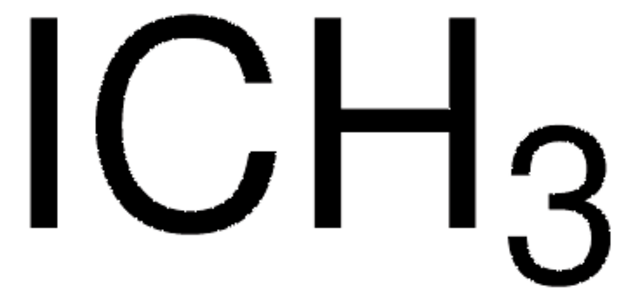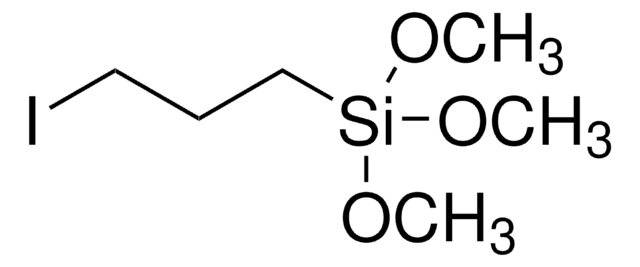413364
3-(Triethoxysilyl)propyl isocyanate
95%
Synonym(s):
Triethoxy(3-isocyanatopropyl)silane, (3-Isocyanatopropyl)triethoxysilane
About This Item
Recommended Products
Quality Level
assay
95%
form
liquid
refractive index
n20/D 1.42 (lit.)
bp
283 °C (lit.)
density
0.999 g/mL at 25 °C (lit.)
functional group
amine
isocyanate
SMILES string
CCO[Si](CCCN=C=O)(OCC)OCC
InChI
1S/C10H21NO4Si/c1-4-13-16(14-5-2,15-6-3)9-7-8-11-10-12/h4-9H2,1-3H3
InChI key
FRGPKMWIYVTFIQ-UHFFFAOYSA-N
Looking for similar products? Visit Product Comparison Guide
Related Categories
Application
- As a bifunctional reagent (isocyanate and ethoxysilyl groups) for the immobilization of cellulose derivatives onto silica matrix to generate bonded type of chiral stationary phases (CSPs).
- To convert 5-amino-1,10-phenanthroline into 5-(N,N-bis-3-(triethoxysilyl)propyl)-ureyl-1,10-phenanthroline, a hydrolysable sol–gel precursor.
- To synthesize ruthenium bipyridyl tethered porous organosilica(Ru-POS) for organo-photocatalysis.
- To synthesize nanoparticle-supported oxime palladacycle catalyst for Suzuki-Miyaura cross-coupling reaction.
signalword
Danger
Hazard Classifications
Acute Tox. 1 Inhalation - Acute Tox. 4 Dermal - Acute Tox. 4 Oral - Eye Dam. 1 - Resp. Sens. 1 - Skin Corr. 1B - Skin Sens. 1
Storage Class
6.1A - Combustible acute toxic Cat. 1 and 2 / very toxic hazardous materials
wgk_germany
WGK 3
flash_point_f
223.7 °F - closed cup
flash_point_c
106.5 °C - closed cup
ppe
Faceshields, Gloves, Goggles, type ABEK (EN14387) respirator filter
Choose from one of the most recent versions:
Already Own This Product?
Find documentation for the products that you have recently purchased in the Document Library.
Customers Also Viewed
Global Trade Item Number
| SKU | GTIN |
|---|---|
| 413364-500ML | 4061841605904 |
| 413364-100ML | 4061832081649 |
| 413364-25ML | 4061832081656 |
Our team of scientists has experience in all areas of research including Life Science, Material Science, Chemical Synthesis, Chromatography, Analytical and many others.
Contact Technical Service





![1,8-Diazabicyclo[5.4.0]undec-7-ene 98%](/deepweb/assets/sigmaaldrich/product/structures/120/564/5b373e23-1624-489c-8efb-692de0f96ffb/640/5b373e23-1624-489c-8efb-692de0f96ffb.png)





![Bis[3-(triethoxysilyl)propyl] tetrasulfide technical, ≥90% (NMR)](/deepweb/assets/sigmaaldrich/product/structures/242/790/625f5cba-32bd-4acf-a3be-e119e9cf844f/640/625f5cba-32bd-4acf-a3be-e119e9cf844f.png)